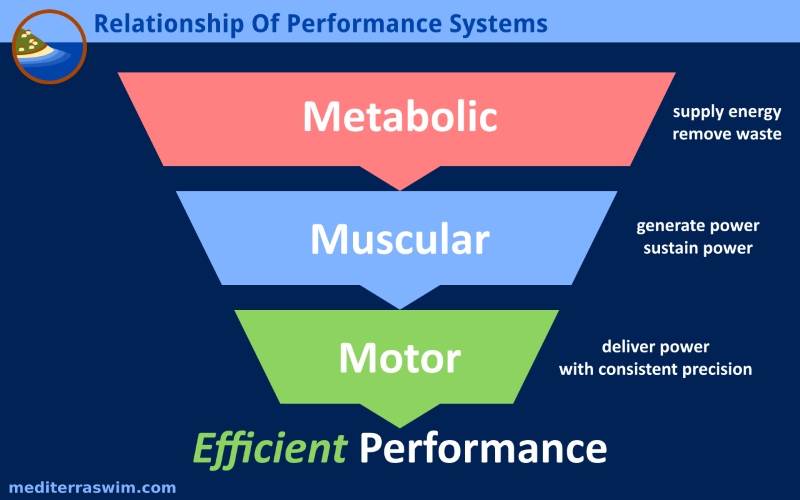The human body is ONE amazing and extremely complex performance system. But for the sake of us trying to comprehend and work with this complexity, we can draw lines around different features of that system to isolate some causes-and-effects that relate to things we can sense and some things we can manipulate in our training.
So, with that understanding, let us divide our performance system into these three systems:

In very general terms, we could say the metabolic system is what supplies energy to the muscles and brain.
The muscular system is what converts energy into power.
And the motor system is what directs how that power will be used – where, when and in what amount.
When you are performing well, you feel abundant energy, your muscles feel strong and adequate for the work, and your movements feel precise.
When you start to fail in achieving quantities or qualities in the middle of a swim, it means that one or more of these systems is starting to fail. The question you want to attempt to answer is, “Which one is failing first in that moment?”
A particularly long swim could deplete your energy supply, though your muscles are not too tired to keep working. You just feel fatigued in general.
A particularly intense set could clog up your muscles with lactic acid and you can’t make them move as faster or as powerful any more. You could recover energy, but your muscles need some rest.
A particularly fast tempo could force you to move your body through the movement pattern faster than your motor control wires can handle and precision drops dramatically. You could recover precision if you had some rest or if you slowed the tempo a bit.
A particularly long swim could fatigue your attention, and as your energy lowers, it is even easier to let aspects of your motor control drop in quality. You could recover the quality if you could rest or if you could increase your attention.
In reality, you may feel an unclear mixture of these. But which one is happening first in this training situation?
It is important to at least attempt to discern which is the weakest system in that moment of failure because this is indicating where your training should be focused.
When you design your tests in such a way to expose your weakest system, then design your practices to strengthen those weaknesses, you cannot fail to keep improving.
Attachments:
You must be
logged in to view attached files.

